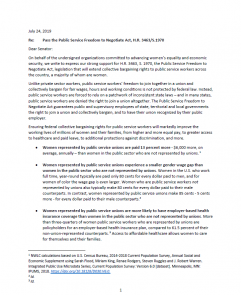 Dear Member of Congress:
Dear Member of Congress:
On behalf of the undersigned organizations committed to advancing women’s equality and economic security, we write to express our strong support for H.R. 3463, S. 1970, the Public Service Freedom to Negotiate Act, legislation that will extend collective bargaining rights to public service workers across the country, a majority of whom are women.
Unlike private sector workers, public service workers’ freedom to join together in a union and collectively bargain for fair wages, hours and working conditions is not protected by federal law. Instead, public service workers are forced to rely on a patchwork of inconsistent state laws – and in many states, public service workers are denied the right to join a union altogether. The Public Service Freedom to Negotiate Act guarantees public and supervisory employees of state, territorial and local governments the right to join a union and collectively bargain, and to have their union recognized by their public employer.
Ensuring federal collective bargaining rights for public service workers will markedly improve the working lives of millions of women and their families, from higher and more equal pay, to greater access to healthcare and paid leave, to additional protections against discrimination, and more.
- Women represented by public service unions are paid 13 percent more – $6,000 more, on average, annually – than women in the public sector who are not represented by unions.
- Women represented by public service unions experience a smaller gender wage gap than women in the public sector who are not represented by unions. Women in the U.S. who work full time, year-round typically are paid only 80 cents for every dollar paid to men, and for women of color the wage gap is even larger. Women who are public service workers not represented by unions also typically make 80 cents for every dollar paid to their male counterparts. In contrast, women represented by public service unions make 85 cents – 5 cents more – for every dollar paid to their male counterparts.
- Women represented by public service unions are more likely to have employer-based health insurance coverage than women in the public sector who are not represented by unions. More than three-quarters of women public service workers who are represented by unions are policyholders for an employer-based health insurance plan, compared to 61.5 percent of their non-union-represented counterparts. Access to affordable healthcare allows women to care for themselves and their families.
- Women represented by unions are more likely to have access to job protected paid family, medical and sick leave. Unionized workplaces are 22 percent more likely than non-union workplaces to provide parental leave and are 12 percent more likely to allow women to take leave during pregnancy. Union workplaces are also 16 percent more likely to allow workers to take medical leave for their own illness and 19 percent more likely to allow workers to take leave for a family member’s illness. These supports are especially important for women, who often shoulder the majority of caregiving responsibilities, by ensuring they can take leave while maintaining employment and continuing to receive wages.
- Women who are represented by unions, including women of color, immigrant women and women who identify as LGBTQ, have more avenues to raise and address discrimination and harassment concerns than workers in non-unionized workplaces. The collective bargaining agreements negotiated by workers and their unions with employers typically contain language calling for dignity and respect at work and often include additional anti-discrimination language. Thus, the union’s grievance and arbitration process can be used to challenge discriminatory employer action. For instance, if an employer cuts a woman’s hours cut after she reports sexual harassment to Human Resources, her union could file a grievance with the employer and help her to get her hours restored.
Public service unions advance and defend equality and economic security for women – and all working people in public service deserve the right to organize. We urge you to co-sponsor and ensure swift passage of the Public Service Freedom to Negotiate Act.
To cosponsor the bill, please contact Stephen Coffey ([email protected]) in the office of Representative Matt Cartwright (D-Pennsylvania) or Jed D’Ercole (Jed_D’[email protected]) in the office of Senator Mazie Hirono (D-Hawaii).
If you have any questions, please contact Sarah David Heydemann ([email protected]) at the National Women’s Law Center.
Sincerely,
(See either of the attached letters for full list of organizations)

